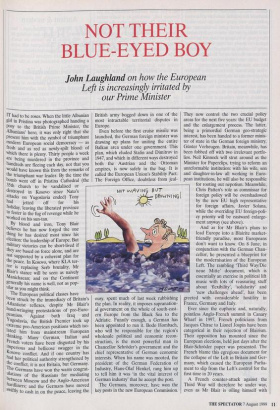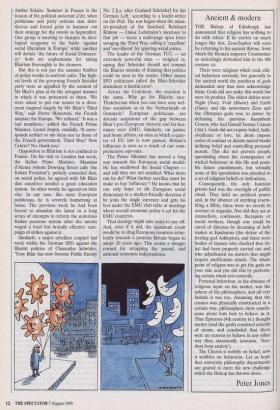NOT THEIR BLUE-EYED BOY
John Laughland on how the European
Left is increasingly irritated by our Prime Minister
IT had to be roses. When the little Albanian girl in Pristina was photographed handing a NV to the British Prime Minister, the Albanians' hero, it was only right that she Present him with the symbol of triumphant modern European social democracy — as fresh and as red as newly-spilt blood: of which there is plenty. Thirty people a week are being murdered in the province and hundreds are fleeing each day, not that you would have known this from the remarks of the triumphant war leader. By the time the bomb went off in Pristina Cathedral (the 35th church to be vandalised or destroyed in Kosovo since Nato's attacks on Yugoslavia ended) Tony had jetted off for his holiday, leaving the liberated province to fester in the fug of revenge while he Worked on his sun-tan.
By blood and iron, Tony Blair believes he has now forged the one thing he has desired most since his election: the leadership of Europe. But military victories can be short-lived if they are based on force alone, and are Tint supported by a coherent plan for the peace. In Kosovo, where KLA ter- ror is replacing Serb brutality, Mr „,131air's stance will be seen as naively wianiehaean; and on the Continent generally his name is well, not as pop- ular as you might think. , The European political classes have been struck by the immediacy of Britain's Atlanticist reflexes, despite Mr Blair's Iland-wringing protestations of pro-Euro- Peanism. Against both Iraq and „ r ugoslavia, the British Premier took up extreme pro-American positions which iso- lated him from mainstream European thinking. Many German, Italian and „.. r'rench voters have been disgusted by his imperious and bellicose swagger in the Kosovo conflict. And if one country has had her political authority strengthened by the conflict, it is not Britain, but Germany. The Germans have won the warm congrat- ulations of the Russians for mediating between Moscow and the Anglo-American hardliners; and the Germans have moved 4, to cash in on the peace, leaving the British army bogged down in one of the most intractable territorial disputes in Europe.
Even before the first cruise missile was launched, the German foreign minister was drawing up plans for uniting the entire Balkan area under one government. This plan, which eluded Stalin and Dimitrov in 1947, and which in different ways destroyed both the Austrian and the Ottoman empires, is now safely in the bag. It is called the European Union's Stability Pact. The Foreign Office, doubtless from jeal- ousy, spent much of last week rubbishing the plan. In reality, it imposes supranation- al government on the whole of south-east- ern Europe from the Black Sea to the Adriatic. Funnily enough, a German has been appointed to run it. Bodo Hombach, who will be responsible for the region's wholesale political and economic recon- struction, is the most powerful man in Chancellor SchrOder's government and the chief representative of German economic interests. When his name was mooted, the president of the German Federation of Industry, Hans-Olaf Henkel, rang him up to tell him it was 'in the vital interest of German industry' that he accept the post.
The Germans, moreover, have won the key posts in the new European Commission. They now control the two crucial policy areas for the next five years: the EU budget and the enlargement process. The latter, being a primordial German geo-strategic interest, has been handed to a former minis- ter of state in the German foreign ministry, Gunter Verheugen. Britain, meanwhile, has been fobbed off with two irrelevant portfo- lios. Neil Kiimock will strut around as the Minister for Paperclips, trying to reform an unreformable institution: with his wife, son and daughter-in-law all working in Euro- pean institutions, he will also be responsible for rooting out nepotism. Meanwhile, Chris patten's role as commissar for foreign policy will be overshadowed by the new EU high representative for foreign affairs, Javier Solana, while the overriding EU foreign-poli- cy priority will be eastward enlarge- ment anyway (see above).
And as for Mr Blair's plans to lead Europe into a Blairite market- friendly paradise, most Europeans don't want to know. On 8 June, in conjunction with the German Chan- cellor, he presented a blueprint for the modernisation of the European Left. The rambling 'Third Way/Die neue Mitte' document, which is essentially an exercise in political lift music with lots of reassuring stuff about 'flexibility', 'solidarity' and 'new challenges ahead', has been greeted with considerable hostility in France, Germany and Italy.
Ever since the euphoric and, naturally, pointless Anglo-French summit in Canary Wharf in 1997, French politicians from Jacques Chirac to Lionel Jospin have been categorical in their rejection of Blairism. Their opposition has mounted since the European elections, held just days after the Blair-Schroder paper was presented. The French blame this egregious document for the collapse of the Left in Britain and Ger- many, which caused the European Parlia- ment to slip from the Left's control for the first time in 20 years.
A. French counter-attack against the Third Way will therefore be under way, even as Mr Blair is oiling himself with -.Ambre Solaire. Summer in France is the geason of the political universite d'ete", when politicians and party activists don shirt- sleeves and forced grins to hammer out their strategy for the rentree in September. One group is meeting to sharpen its ideo- logical weaponry in the battle 'against social liberalism in Europe' while another will debate 'the future of Social Democra- cy': both are euphemisms for taking Blairism thoroughly to the cleaners.
But this is not just the summer blabber of policy wonks in seafront cafes. The high- est levels of the governing French Socialist party were as appalled by the content of Mr Blair's plan as by the arrogant manner in which it was presented to them. 'We were asked to put our names to a docu- ment inspired largely by Mr Blair's Third Way,' said Pierre Moscovici, the French minister for Europe. 'We refused.' It was a bad manifesto,' added the French Prime Minister, Lionel Jospin, candidly. 'It corre- sponds neither to my ideas nor to those of the French government. Third Way? New Centre? No, thank you.'
Opposition to Blairism is not confined to France. On his visit to London last week, the Italian Prime Minister, Massimo d'Alema (whom Downing Street calls 'the Italian President'), politely conceded that, on social policy, he agreed with Mr Blair that countries needed a good education system. In other words, he agreed on little else. In any case, like most European politicians, he is severely hamstrung at home. The previous week he had been forced to abandon the latest in a long series of attempts to reform the notorious Italian pensions system after the unions waged a brief but brutally effective cam- paign of strikes against it.
Similarly, a major rebellion erupted last week within the German SPD against the Blairist policies of Chancellor Schroder. 'Tony Blair has now become Public Enemy No. 2 [i.e. after Gerhard SehrOder] for the German Left,' according to a leader-writer on Die Welt. The row began when the minis- ter-president of the Saarland, Reinhard Klimmt — Oskar Lafontaine's successor in that job — wrote a multi-page open letter savaging the Third Way, calling it 'repellent' and `neo-liberal' for ignoring social justice.
The leader of the German TUC — an extremely powerful man — weighed in, saying that Schroder should not commit the Blairist mistake of thinking that politics could be won in the centre. Other senior SPD politicians called the Blair-Schroder document 'a fateful error'.
Across the Continent, the reaction is the same. Why go for Blairite neo- Thatcherism when you can have cosy wel- fare socialism as in the Netherlands or Denmark? European politicians are already suspicious of the gap between Blair's pro-European rhetoric and his hes- itancy over EMU. Similarly, on justice and home affairs, an area in which a quar- ter of EU law is now passed, Britain's influence is zero as a result of our com- prehensive opt-outs.
The Prime Minister has moved a long way towards the European social model. He has swallowed the Social Chapter — and still they are not satisfied. What more can he do? What further sacrifice must he make to buy 'influence'? He knows that he can only hope to tilt European social democracy in a market-friendly direction if he joins the single currency and gets his feet under the EMU club table at meetings where overall economic policy is set for the EMU countries.
That strategy might take years to pay off. And, even if it did, the maximum result would be to drag European countries reluc- tantly towards a position Britain began to adopt 20 years ago. This seems a meagre reward for scrapping the pound, and national economic independence.



























































 Previous page
Previous page